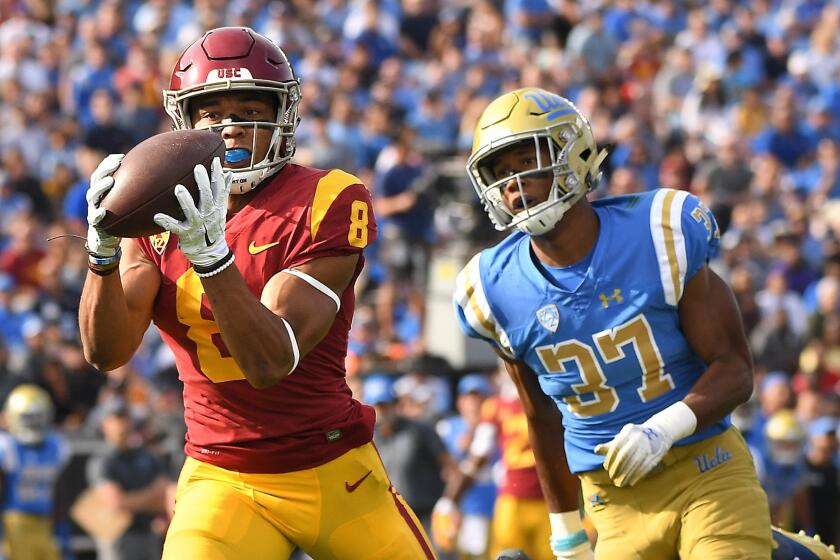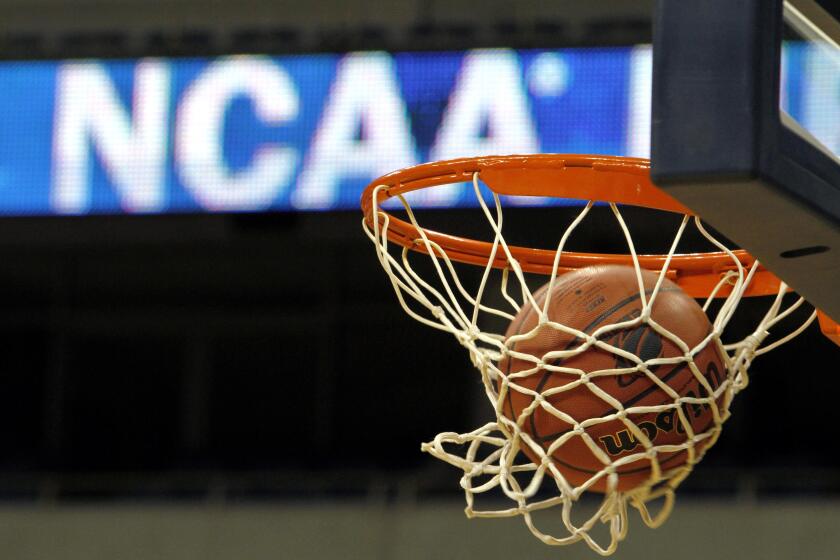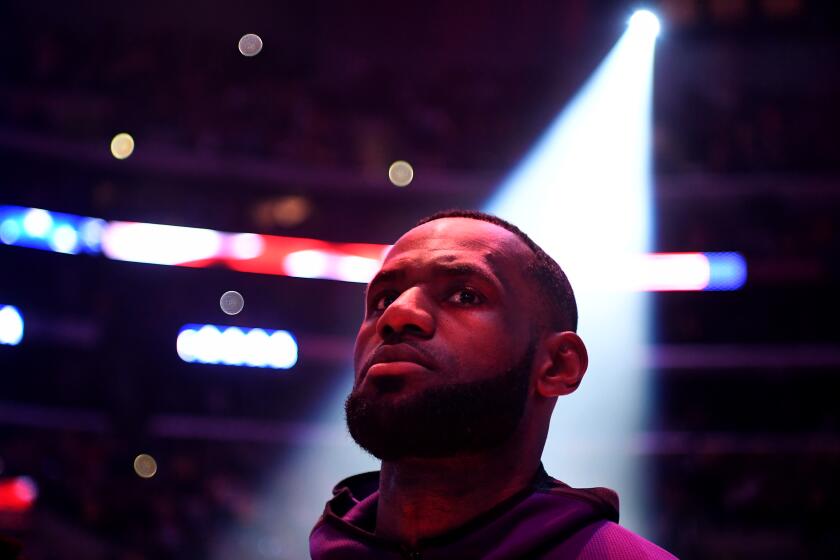Dabo Swinney makes $9.3 million a year but doesn’t think players should be paid. Why?
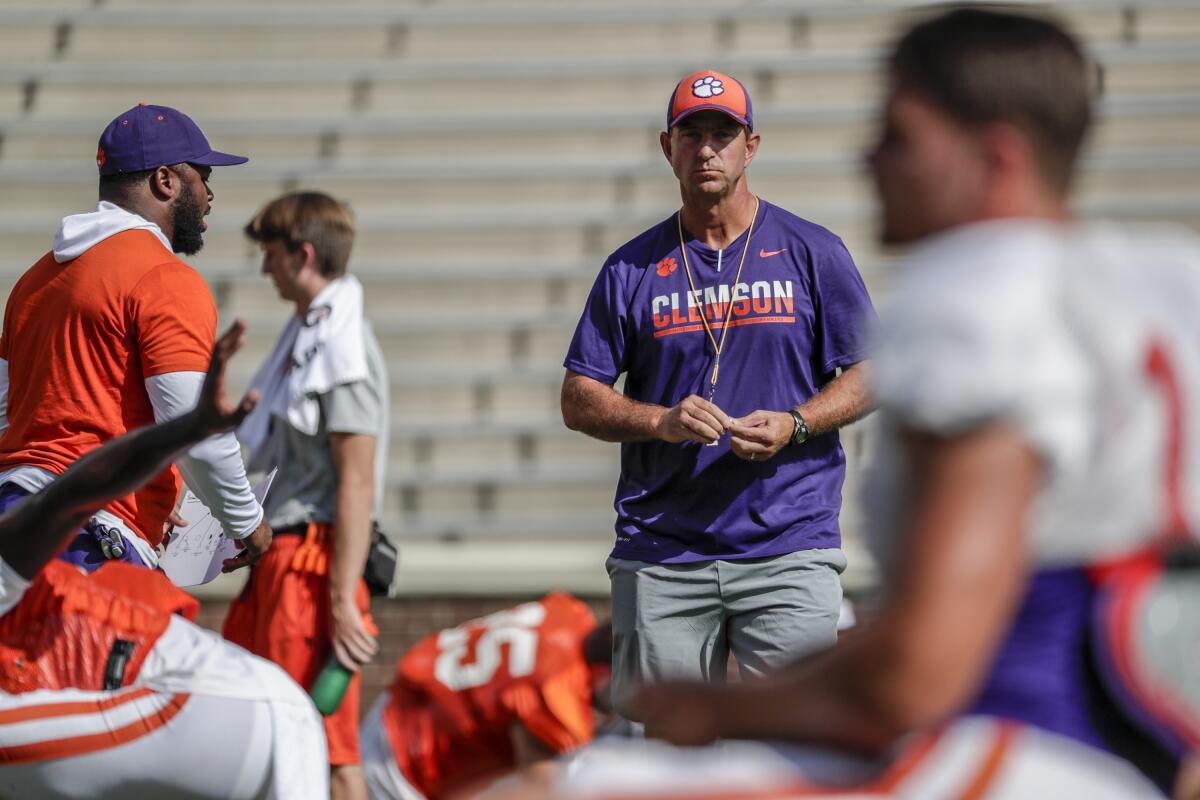
- Share via
CLEMSON, S.C. — Dabo Swinney has had better days. But, as is his way, he slaps a smile onto his suntanned face, welcoming two visitors into his palatial corner office and offering them water on a hot summer day.
“Ya’ll come on in,” he says.
This mid-August morning got off to an auspicious start when a public relations official came across a headline he felt obligated to share with Swinney, coach of Clemson’s two-time national championship football team. An essay had been posted the night before on the website for New York Magazine.
The title: “Dabo Swinney is College Football’s Real Evil Villain.”
“It’s crazy,” Swinney says.
When feeling attacked, Swinney just keeps going. Between the Tigers’ morning scrimmage and an afternoon staff meeting, he takes swigs from a cold Diet Coke for a mid-day caffeine grab while pondering his life on top of a sport whose bottom he knows just as well.
What in the world did the football coach at Clemson — a public university founded in a town of 17,000 people with a sprawling campus that rises out of nowhere from South Carolina’s western farmland — do to warrant a scathing attack in a space normally reserved for writing on culture and style in America’s biggest city?
Some NCAA and college officials are predicting doom for sports programs in wake of new California law enabling athletes to receive payment for use of their name, image or likeness. They said similar things 50 years ago, about Title IX.
Recently, Swinney, pronounced as Sweeney, was asked whether former starting quarterback Kelly Bryant, who left the Tigers four games into last season after losing his job to freshman Trevor Lawrence, had been given a ring honoring Clemson’s 2018 national championship run? Swinney said no, because Bryant wasn’t on the team.
“I mean, that’s like a week-long story!” Swinney says.
Swinney’s boyish exuberance used to work to his benefit. Ten years ago, it would have been described as charming. But in this new era of college football, when player rights are being questioned by observers interested only in who’s winning and losing on the financial balance sheet, Swinney has become an easy target, an obvious representation of the sport’s long-entrenched good-ol’-boy network.
He hasn’t gone around looking for trouble, but he has been willing to speak his mind when asked about paying players, something he is beginning to regret. In 2014, answering a question about players forming a union to negotiate for themselves, he said, “As far as paying players, professionalizing college athletics, that’s where you lose me. I’ll go do something else, because there’s enough entitlement in this world as it is.”
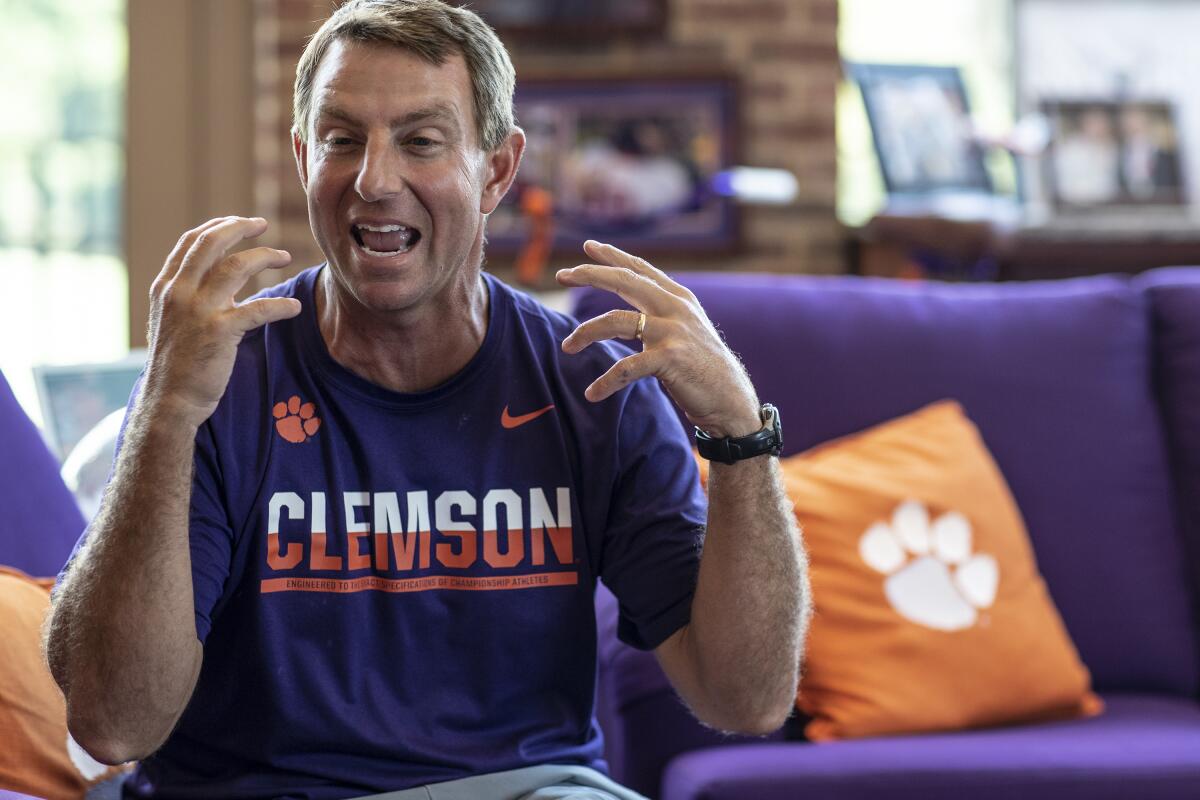
When Swinney and Clemson agreed to a 10-year, $93-million extension in April, the fattest total contract of any university employee in the country, those five-year-old comments resurfaced, with Swinney labeled as entitled.
“Everybody says, ‘Well, OK, you make all this money,’ ” Swinney says. “Well, OK, I don’t set a market.”
At Clemson, Swinney has been the right coach at the right time, turning the Tigers from lovable losers — “Clemsoning” used to be a verb used for choking a big game away — into the foil of Nick Saban’s Alabama dynasty. But nationally, with a groundswell of political momentum growing out of the California legislature for college athletes to be able to profit from their name, image and likeness, Swinney comes off like an anachronism.
That he can be portrayed as a coach who doesn’t look out for his players’ best interests has come as a shock to Dabo, who got his nickname because his older brother, Tripp, called him “dat boy” as a toddler. Like many of his players, Dabo’s upbringing came with few built-in advantages; he walked onto the Alabama football team and emerged as his family’s first college graduate. He naturally assumed an underdog role his whole life. The challenge is keeping that fire ablaze now that he’s made it.
“My life changed through education,” Swinney says. “I saw a lot of great football players that the crowd roared for and this and that, and then all of a sudden I saw them at 30. And they didn’t have their education. And life is tough. And I’ve never wanted that for my players. I want young people who value that experience, who value education.”
Everyone has their own definition of what is amateur and what is pro, the NCAA included. When Dabo says pro, he means players being paid a salary.
The California Senate Bill 206, signed into law Monday, would not put players on salary, but it would allow them to be compensated for use of their name, image and likeness (NIL) through endorsement deals with third parties.
What will the NCAA do in response to the first state challenging its rules on amateurism, which limit athlete compensation to the full cost of being a student?
South Carolina state legislators are planning to put forth a similar bill in January, but Swinney says he has not thought about NIL payments for his players.
“No, because I don’t have any control over anything,” Swinney says.
That’s true. He does not make the laws of the land or the NCAA rules. But he does hold this office in the heart of college football’s establishment, surrounded daily by a $55-million practice facility that features a giant playground-style slide to get from the second floor to the first, bowling lanes and miniature golf holes, all in the name of maximizing that special student-athlete experience.
Swinney has his opinion about what college sports should be, some parts better researched than others, none of it villainous. He talks fast and free, seemingly without preparation. He’d prefer it if someone would actually stick around and hear him work through his thoughts, giving them proper context.
He’s tired of being the subject of “clickbait,” as he puts it. He’s ready to make his case, all while struggling to accept his place in college sports’ progressive new climate.
Swinney turns and flashes a quizzical look.
“You came all the way out here to ask me about paying athletes?” he asks.
::
As Clemson’s athletic director, it is Dan Radakovich’s job to answer the big financial questions. Last winter, after the Tigers whipped Alabama 44-16 in the College Football Playoff title game to win their second national championship over the Crimson Tide in three years, it was time to put a new number on the value of Dabo Swinney.
The $9.3-million annual salary he and Dabo’s representation agreed upon was conveniently slotted just under the $9.44 million Saban reportedly makes per year, but the total package made a statement about both sides’ commitment with 10 years and $50 million guaranteed.
“While it may sound large,” Radakovich says, “we are reaping the benefits of this. He has a positive ROI [return on investment] as it relates to our athletic program.”
“There is great value that he puts on an education that is not equivalent to dollars and cents, where the world might not have that same view.”
— Clemson athletic director Dan Radakovich on Dabo Swinney
As proof, he and his staff put together an 18-page presentation called “The Swinney Effect” that members of the Clemson board of trustees could refer to as they were deciding whether to approve the deal. Among the details:
Clemson sold 14,000 more season tickets in 2018 than it did in 2010, and the overall ticket revenue jumped by $7 million per year during that span. Clemson’s total athletic revenue was $121.7 million in 2018, more than double its $57.6 million in 2010. Out-of-state applications rose from 11,000 to 21,000 over those eight years, showing the growth of the university brand corresponding with the Tigers’ rise from mediocrity to greatness.
“Dabo is one of the smartest people I’ve ever met,” Radakovich says, “and I think that a lot of the things he says he really feels. There is great value that he puts on an education that is not equivalent to dollars and cents, where the world might not have that same view. Our athletes get world-class facilities, world-class coaching, incredible academic support. So there are a lot of things that are free. It’s a totally different experience than it was 20 or 25 years ago, where a student-athlete was really pretty much on their own.”
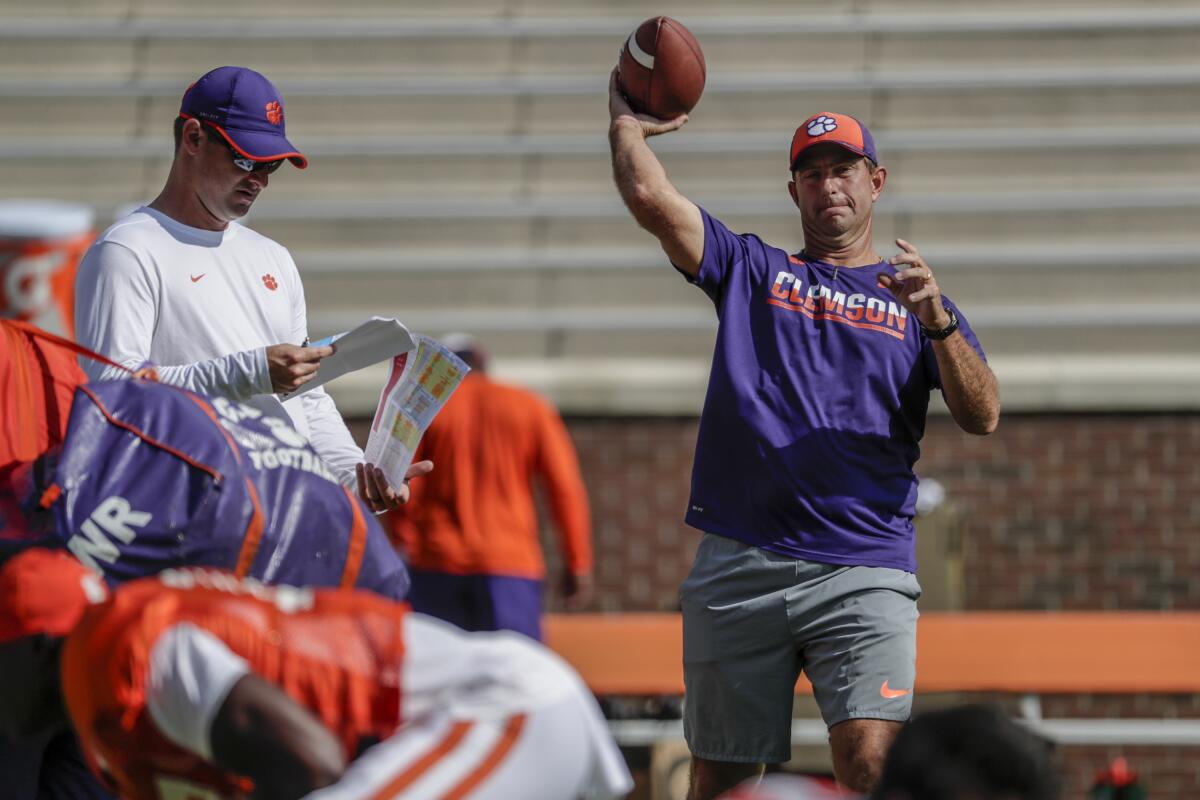
Radakovich hasn’t attempted the complicated math on what the average Clemson football player’s ROI is. Certainly, there’s hefty investment in every Tiger, what with the tuition, room and board, books and full cost of attendance stipend. And for some players who receive a federal Pell grant, there’s even more money to assist them.
“That could be, you know, close to $20,000,” Radakovich says. “The naysayers say, well, that’s not enough. Well, what is enough? What is the right number? Because if we begin to pay student-athletes, all those things I just talked about probably go away.”
Down the road in the state capital of Columbia, two South Carolina legislators don’t sound conflicted at all about how college football’s economy should function. Sen. Marlon Kimpson and Rep. Justin Bamberg applauded the first step taken in California and are prepared to push similar legislation in 2020.
In South Carolina, there are no major professional sports franchises, meaning football and men’s basketball at Clemson and the University of South Carolina are as big-time as it gets.
“They’re worried about what are they going to do in the locker room when the star player is getting endorsements,” Bamberg says of college sports officials. “What do they do in the locker room when the coach is making $10 million a year and the player can’t pay rent or take his girlfriend out?”
The rhetoric from the NCAA and the schools, to Bamberg, is steeped in idle threats.
“Like we say in the South, the pigs get fed and the hogs get slaughtered,” Bamberg says. “There are some hogs when it comes to the money college sports bring in.”
Kimpson became drawn to this issue when former star South Carolina running back Marcus Lattimore suffered several major knee injuries during his time with the Gamecocks. Lattimore was one of the top players in the country, but he never gained a yard in the NFL.
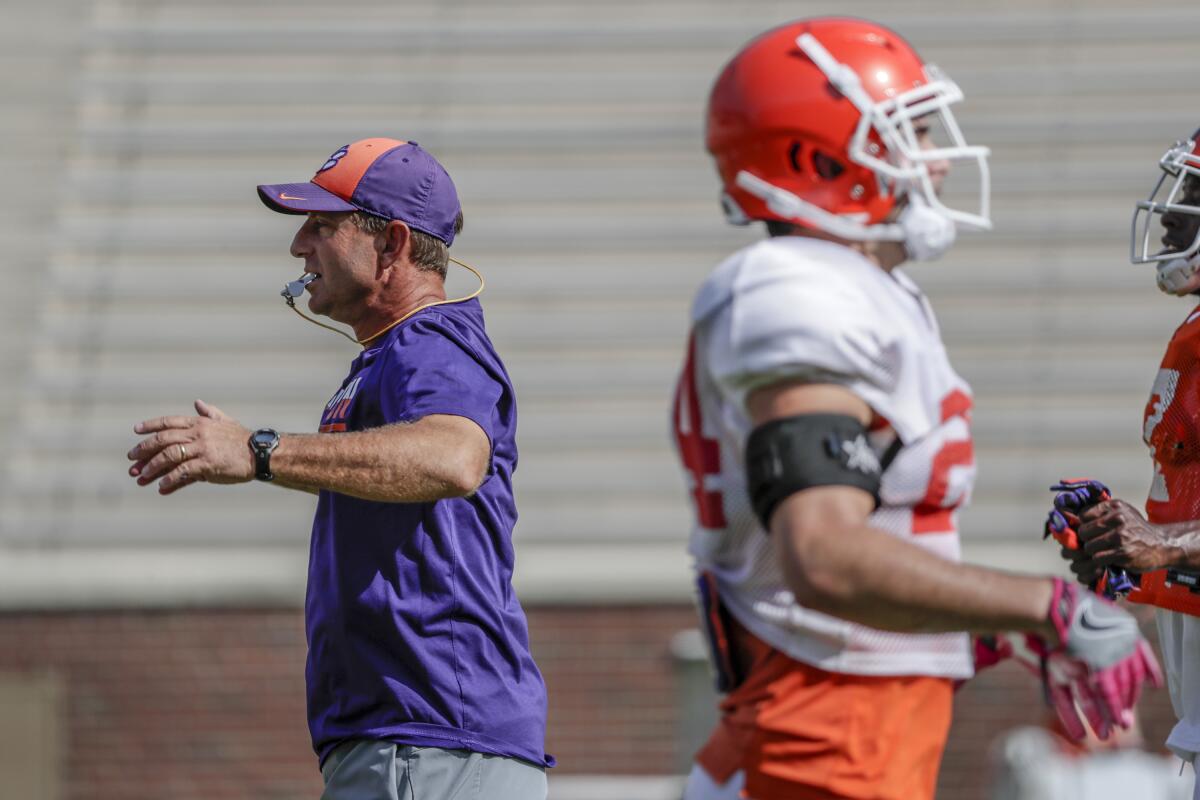
Kimpson and Bamberg sponsored a bill in 2015 to require South Carolina schools to give players an extra $5,000 stipend each year and a $20,000 medical trust at the time of graduation. That bill went nowhere. Now, they plan to present a bill that also allows NIL payments for players.
Says Kimpson: “We have already gained a little more traction because I’ve had several Republican colleagues mention to me, ‘You’re right, Kimpson.’ This is still an uphill battle. Most of the things that Democrats fight for are uphill battles in a Republican-dominated, football-loving, Bible-toting, bourbon-drinking state, but that doesn’t mean we shouldn’t engage.”
Kimpson and Bamberg would love help from any important person in their state to push their cause, but they know Swinney is unlikely to be an ally.
“I applaud coach Swinney for his success, and I’m proud of Clemson being the No. 1 football team in the country,” Kimpson says, “but I can think of no one more entitled than him, to be in this position mainly because of the players that he coaches.”
::
It’s only natural for an outsider to presume what it’s like inside one of college sports’ ivory towers. Dabo Swinney, the son of an alcoholic father who loved the Alabama Crimson Tide more than his next drink, never imagined he would end up enveloped by riches.
“When I look in the mirror, I see the same guy from Pelham, Alabama,” Swinney says, “and if I was growing up in today’s world, I would be labeled an at-risk kid, if you will. We grew up in a home with violence and addiction and divorce and homelessness and no education, zero.
“And then when you walk on at Alabama at 170 pounds, you’re probably an at-risk player. And then when you’re hired as an interim coach, you’re probably an at-risk hire. I just kind of look at myself as the same, and there’s no amount of success ... we could win five national championships in a row. I love what I do. And I love the process of what I do.”
Swinney believes in God, openly sharing that faith with his players and their families from the moment he meets them. And he believes that he would not be the man he is today, a passionate molder of young men, without those crucial years he spent stressing and toiling as a student in Tuscaloosa.
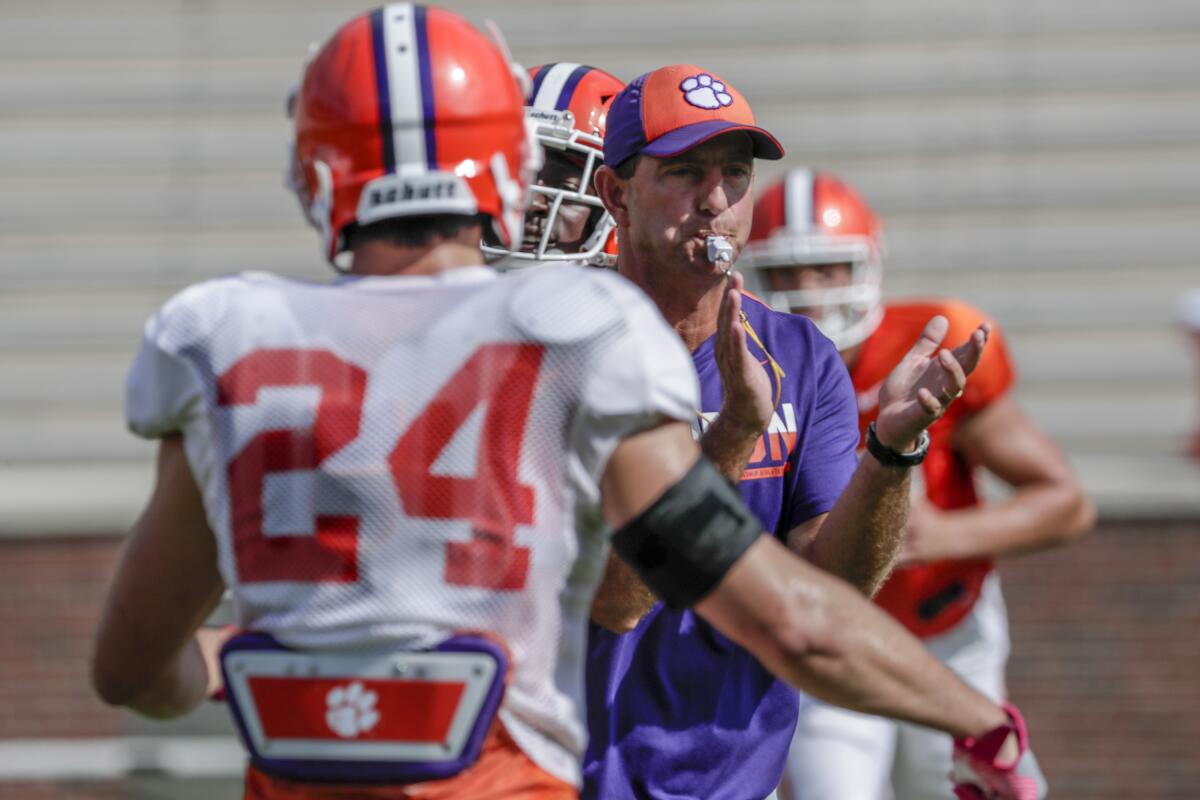
Before his feelings about the professionalization of college sports can be fully appreciated, you have to go with him there, to the beginning of his sophomore year. Swinney, a wide receiver, had made the team as a walk-on and was going through his first full camp with the Crimson Tide, the team he grew up idolizing. His girlfriend and future wife, Kathleen, was a year younger and joining him at Alabama. It was all finally coming together.
But one day close to the start of classes, Dabo went to register and was told that his tuition money had not come in for the fall semester. As he remembers it, he was given to the end of the day to pay half, about $600, or he would not be enrolled for class.
“And I just cried like a baby,” Swinney says. “I called my mom at work and told her what was going on, and I just remember sitting in that little apartment by myself in the dark, feeling sorry for myself.”
Neither he nor his family had that $600, or the rent he already owed on his place. He tried to be rational about it. He could go home and get a job and then try to walk onto the team at Alabama Birmingham, perhaps.
Then, fate walked Swinney out to his mailbox. Inside, a letter from Discover waited. It wasn’t a card, but a new program called Discover Checks. He was confused. He didn’t have an account with Discover. But he called the company to inquire. A back and forth ensued, and, by the end of it, the woman on the other end of the line was telling him he had $1,000 credit to write checks.
“God just, like, stepped in here,” Dabo says. “It was just unbelievable.”
He wrote one check to the university and one to his landlord.
“Still got that card,” Dabo says with a smile. “Member since 1989.”
Swinney got back on his feet, eventually earning a scholarship from Alabama coach Gene Stallings and contributing on the Crimson Tide’s 1992 national championship team. He rarely had a care-free college experience, though, at one point sharing a bedroom in his apartment with his mom. But he got that degree in commerce and business administration and, later, a master’s degree in business administration.
Kendall Ellis enjoyed intense, yet fleeting, fame as an NCAA track champion. A new California law, formerly SB-206, would have also allowed her to cash in.
Dabo views college sports through that personal prism, one defined by testing himself inside the classroom and on the field, but he has been willing to adapt his viewpoint only so much to the massive changes in the world around him.
For perspective, when Stallings was hired to coach Alabama in 1990, his salary was $104,000. Adjusted for inflation of the U.S. dollar, that equates to $204,000 today.
The $9.3 million Swinney will make this season amounts to about a 4,000% increase from what the market said a coach was worth in 1990 — inflation owed entirely to the growth of the college sports industry the last three decades.
When Swinney played for Alabama, there was no telling if the game was going to be televised, much less which network would carry it. Today, the Southeastern Conference’s contract with CBS and ESPN for rights to air games combine for more than $200 million annually.
The market adjustments have lined everyone’s pockets but the players.
“We’re all shaped by our experience,” Swinney says. “And you’re talking about a guy who’s been at every level. I’ve been the walk-on, I’ve been the scholarship player, I’ve been the graduate assistant. I’ve been the assistant. I’ve been the lowest-paid head coach. I’ve been one of the highest-paid. And I have a very clear vision.”
Swinney has a disclaimer for everything he’s about to lay out: He doesn’t know if he’s right.
It starts and ends with education, and he believes that what Clemson offers its players is worth more than any extra cash they could find in their blue jeans. He proudly quotes that Clemson, Duke and Northwestern are the three Football Bowl Subdivision programs to be top 10 in the NCAA’s Academic Progress Rating in eight of the last nine years; that he has had 220 of 225 seniors graduate since becoming permanent coach; and that former star defensive lineman Christian Wilkins winning last year’s Campbell Trophy as the college football player with the best combination of academics, community service and on-field performance means more to him than any national championship.
“They say, ‘He’s against the player.’ Give me a break! I’m for the player! Tie everything to graduation, so you have the student-athlete in the collegiate model.”
— Dabo Swinney
Swinney is reminded that public perception, fueled by a fake-classes scandal in his own conference at North Carolina, is that college football players are not being challenged academically in the same way as other students.
“Not at Clemson,” Swinney says defiantly. “Not at Clemson.”
A basis for his vision is that the moment the enticement of extra money is introduced, his players will lose incentive to care as much about getting their degree. That could be read as insulting to them, or just as a coach knowing his players and the temptations they face, the backgrounds they’ve escaped.
“See, the people who are on that side, they don’t want to value education,” Swinney says. “Everybody acts like that’s free. I mean, it’s $40-to-50,000 a year to go to Clemson. And that’s real money. That’s not like, you know, Monopoly, Candy Land, it’s real money that’s being paid. They’re being paid well, and I break that down with my guys every year.
“There’s a lot of kids walking off this campus in debt. I walked out of college with debt. I wish I had a scholarship the whole time. I didn’t. And it took me 10 years to pay that back.”
Swinney says he is all for “modernizing the scholarship.” He loves the stipend for full cost of attendance and that programs are now allowed to feed the players as much food as they want. He wishes they could pay for the parents to travel to games. He’s open to a certain amount of money going into an annuity tied to each player’s graduation.
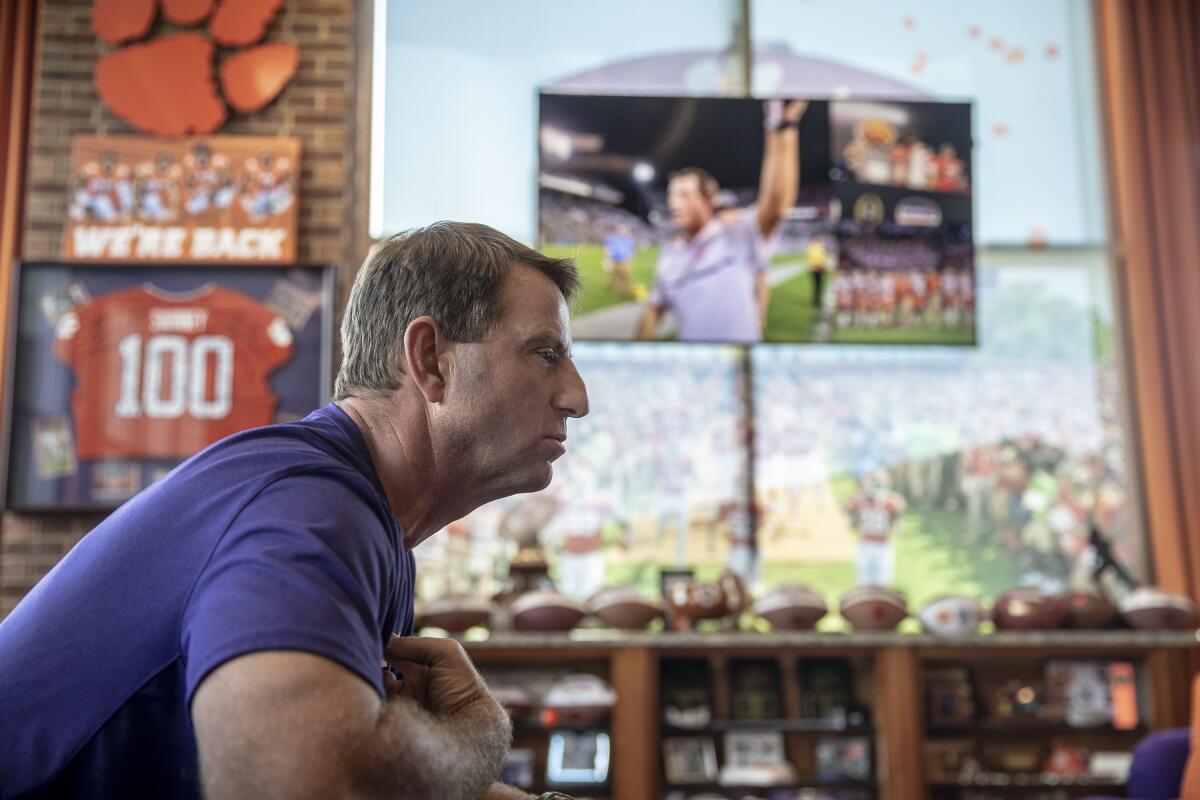
“See, nobody ever writes any of this,” he says. “They say, ‘He’s against the player.’ Give me a break! I’m for the player! Tie everything to graduation, so you have the student-athlete in the collegiate model.
“The collegiate model is a beautiful thing. And it’s been a great thing. The scholarship for a long time was archaic, and it needed to be changed and addressed. Nobody wants to acknowledge that. Right? Because that doesn’t fit the story. You know, they’re supposed to be starving. These guys ain’t starving. These guys got money. They got cars, they got tattoos, because they’ve got money. It’s a different situation than when I was in school.”
Swinney’s doomsday scenario, the one that he says would send him packing, goes like this: College football players are paid a salary. They are employees, which means they have to pay taxes on their earnings like any other student would.
“Let’s scrap the whole college model,” he says. “The average income in America is $43,000. Let’s pay them 100 grand. We can do that. But they gotta pay for college, like normal people, right? You’re 18 years old, you get 100 grand, you pay for your apartment, you pay for your cable, you pay for your food, you pay for your medical, you get insurance, you pay for your books, fees, and you pay for your tutor. You could be fired too. How would that work? How would that go over? That would be a train wreck.”
His speech is halted by the demands of a job that never stops; he has a meeting to lead.
Who knows what his critics will have to say now? Luckily for Dabo Swinney, as one of college football’s made men, he doesn’t have the time to worry about it.
More to Read
Go beyond the scoreboard
Get the latest on L.A.'s teams in the daily Sports Report newsletter.
You may occasionally receive promotional content from the Los Angeles Times.

